By Kallie Cox
Featured Image Courtesy of The Bach Society of Saint Louis; Photo by STL Photo
The Regional Arts Commission of St. Louis is a large part of what makes the city unique, and its funding of the art cements it as a destination of culture in the region.
For over 40 years, RAC has given more than 7,300 grants totaling more than $115 million to hundreds of St. Louis artists — both the well-known and the niche.
But the first organizations selected to receive a grant by RAC have stuck with the organization and the community, becoming pillars that shape and define what St. Louisans live and experience every day.
Since the city’s founding, St. Louis has been known as a musical locus — attracting and molding brilliant Blues and Jazz stars who would rock the nation.
Four of RAC’s first grantees understand the importance of music in the community, and for decades they have upheld the city’s legacy as a stepping-stone and haven for musicians.
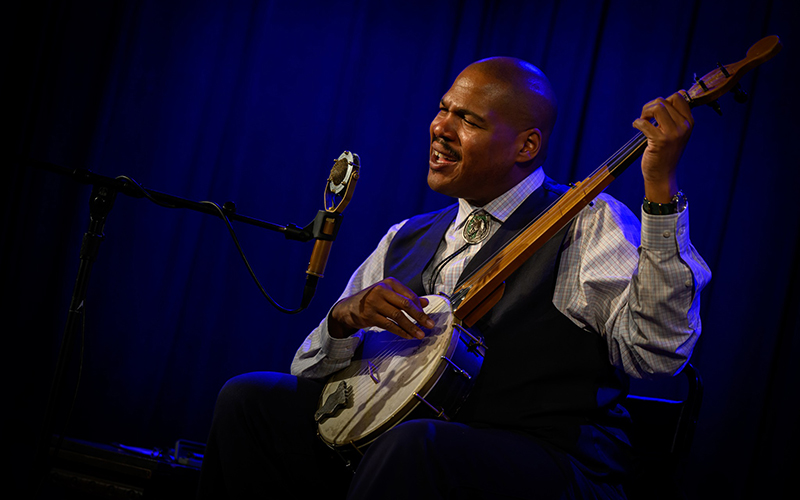
Jerron “Blind Boy” Paxton at the Focal Point; Photo by Reed Radcliffe
The Focal Point
In the backroom of a St. Louis music shop, a nun operated a folk music club, producing lively concerts and organizing a rag-tag group of performers.
When the nun decided to take a break from the convent and hit the road, she turned the club’s records over to Judy Stein who — in her words — became the general manager, artistic director, chief cook and bottle washer for a “long, long, time.”
The Focal Point was originally founded in 1975 by Bill and Janet Boyer who owned a popular local music store and had an affinity for folk music, according to Stein.
However after the Boyer’s son was injured in a motorcycle accident and the store had to sell its backroom, finding a meeting place for the concerts became a bit of a craps game, Stein said. She knew something had to change and with RAC’s formation, Stein applied for a grant to help.
This help got them through the year and allowed them to continue operating by paying for equipment and venues.
Over time the organization grew from a small operation to one that hosts international talents and now produces roughly 100 concerts a year.
For Stein, folk music has always been a way of life.
“My interest in folk music in particular began when I got a record player for Christmas, when I was 11 or 12,” she said. “At the same time, I was having a bit of trouble at school. So I would skip school — I grew up in East St Louis — ride the bus across the river to St Louis with my lunch money and listen to records in the library downtown.”
Stein grew up surrounded by music, singing hymns with her mother and grandmother, hearing union tunes from her grandfather, and learning Irish folk from a policeman in the neighborhood. And, she listened to all of the Library of Congress records from the depression era, she said. When she discovered Focal Point, she became a regular.
Now Stein’s involvement in Focal Point and love of folk has been passed to a second generation. Her son now handles the bookings for the club.
Focal Point means more than keeping folk music alive in St. Louis — it creates a safe opportunity for up-and-coming musicians to perform. One of the factors allowing them to have this presence in the community, is RAC’s support which helped them to purchase a permanent space of their own.
“Because we had our own building, we could open up the space to other people who were struggling like us in church basements and things like that,” Stein said. “So we have now a regular bunch of renters. We’ve got a group that does songwriting. They have a workshop there. We have a group of strictly writers, actual literary writers, who rent the building a couple times a month and we’ve got several dance groups who use the building.”
RAC put The Focal Point on a more sound financial level than they had before, and so now they are able to pass that along to other groups, Stein said.
“We can provide a space for less affluent groups who are doing legitimate work in the music field, in the arts,” she said. “We can also provide music that is not going to be heard in most other places in town because of the fact that we’re not commercial (…) we don’t hire people because of their commercial success. We hire people because they’re musically interesting.”
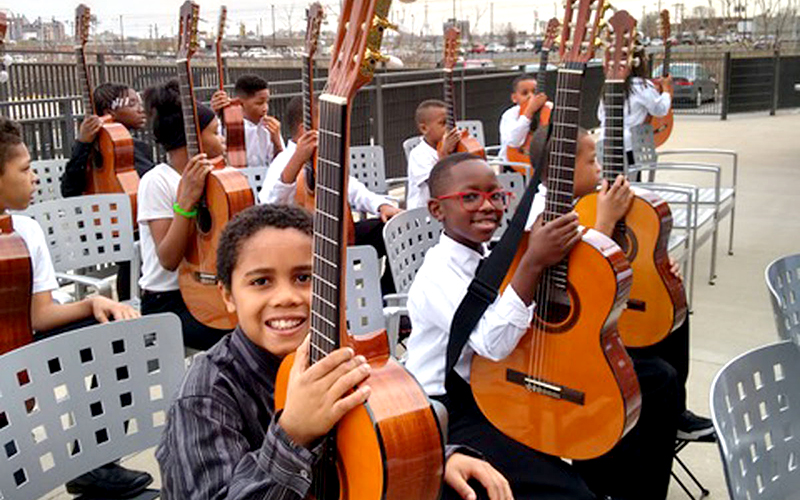
Courtesy of St. Louis Classical Guitar
St. Louis Classical Guitar
St. Louis Classical Guitar is entering its 61st season. Executive Director Brian Vaccaro said that in addition to bringing in expert guitarists from around the globe, the organization is active in St. Louis schools.
“We’ve got education programming where we go into area schools and install guitar education programs for grades roughly three through 12. And so, we’re in quite a number of schools around the St Louis area. Usually they’re situated in underserved neighborhoods where they wouldn’t otherwise have programs such as this,” Vaccaro said.
The education program started as a result of the police murder of Michael Brown in Ferguson Missouri, Vaccaro explained.
“We started our education programming in the Ferguson Florissant school district as a result of that situation,” he said. “It has sort of grown exponentially to the point where we’re in anywhere between 15 and 20 schools in any given academic year.”
The organization’s community engagement programming also evolved around this time. This created a radio station program, community guitar ensembles, open stage events and classes, he said.
RAC’s support of the organization means it can expand its educational outreach and bring in big-name musicians to a city they might not otherwise consider performing in, he said.
“What we’re trying to really do for the St Louis area is bring something that is of beauty to people of all walks of life,” Vaccaro said. “Whether it be they get to hear a master musician play at one of our concerts, or if it’s a kid that’s just learning how to play, or if it’s a hobbyist that wants to get involved in one of our ensembles, or wants to tune into our radio program, or whatever it is — we’re just trying to raise the bar of like artistic beauty and guitar happens to just be the vehicle that we use to do it.”
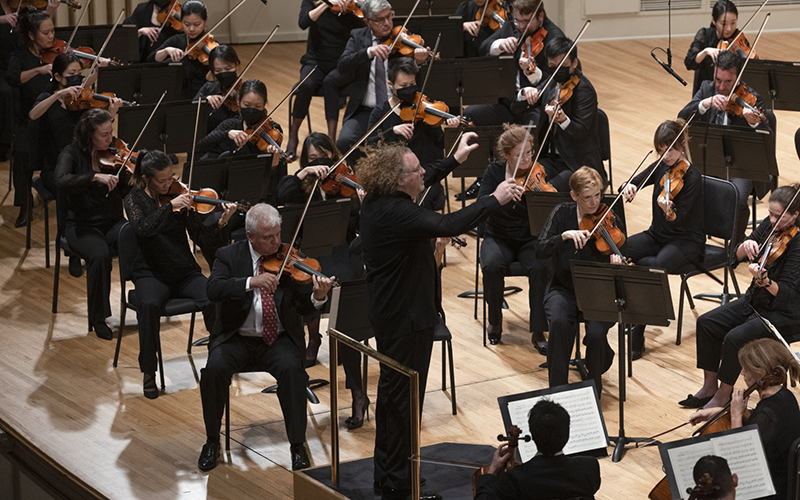
Courtesy of St. Louis Symphony Orchestra
Saint Louis Symphony Orchestra
The Saint Louis Symphony Orchestra is the driving force behind RAC’s formation, and it continues to make history both internationally, and at home. SLSO was one of the first orchestras to obtain a majority female membership and is the most senior orchestra in the nation.
“It was established in 1880 in St Louis, it is the second oldest in the country, after the New York (Philharmonic),” Marie-Hélène Bernard, president and chief executive officer of the SLSO said. “So if you think of 145 years of existence, the Saint Louis Symphony Orchestra has been a center of the cultural fabric of our region and community.”
The orchestra is one of the best in the country and its artistic scope is unparalleled, she said. This talent, coupled with the generosity and care the musicians who live here to work for the orchestra pour back into their neighbors results in inimitable performances and a world-class education for students as SLSO offers numerous programming opportunities and visits with local schools.
“That’s the spirit that we share, that music is for everyone,” Bernard said. “We want this to be an experience of the heart, and we really work really hard to move this experience from an intellectual one to one that’s an emotional experience. So we never want self-imposed barriers to be a barrier to access. We want everyone to know this is your orchestra. This is music you can relate to, and music is a universal language.”
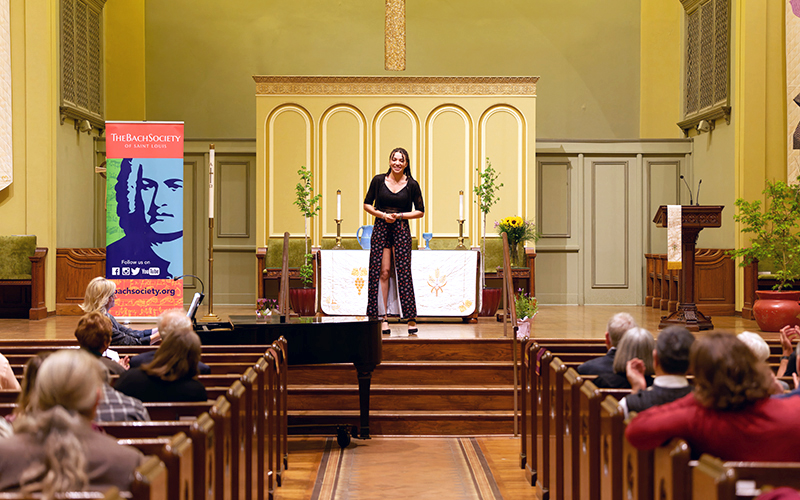
Courtesy of The Bach Society of St. Louis; Photo by STL Photo
The Bach Society of Saint Louis
The Bach Society of St. Louis is the city’s oldest semi-professional chorus, according to its Executive Director, Melissa Payton. It was founded in 1941 and this season it has approximately 60 singers.
Its concert season runs from October to May but it is largely known for its annual Christmas Candlelight Concert — a longstanding tradition beloved by St. Louis families.
“Our mission is that we perform choral works inspired by Bach and those who have come after him,” Payton said. “So we perform all different kinds of choral works (and) we commission new pieces of music.”
Additionally, the chorus offers a young artist program that hires emerging musicians and pays them for a year while they perform.
A. Dennis Sparger, Music Director & Conductor, said for as long as he can remember, the organization has been supported by RAC.
Working with both choirs and orchestras has been a lifelong passion for Sparger and he joined the organization in 1986.
“This music never goes out of date,” Sparger said. “It never loses its style. It always inspires and lifts us up. It keeps us spiritually engaged as well as artistically.”
Sparger and Payton work tirelessly to ensure that their passion for classical music lives on in the next generation of the community by offering programs to both students and teachers who might not otherwise have the opportunity to be exposed to the concerts.
This includes offering private voice lessons to underserved school districts.
“We’ve developed this new free lessons program that we take into the schools during the school day. So we bring private voice teachers in to work with the students there,” Payton said. “And many of these schools are in communities where kids can’t afford additional private lessons.”
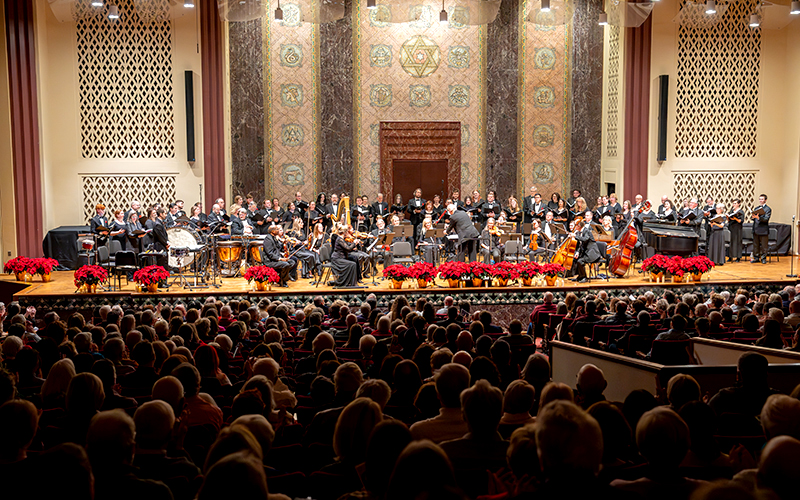

Follow Us On Social Media